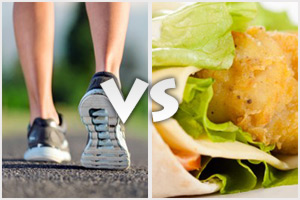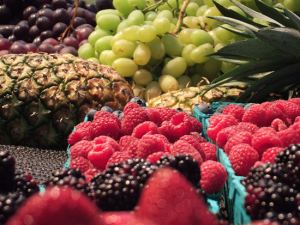How to Lose Weight
Are you tired of carrying around the extra pounds? Or do you want to shed extra weight once and for all? This article covers the basics including how to eat, exercise and stay motivated to lose weight. It also covers some specific diets that you may want to try in your journey to a smaller, healthier you.
Steps
Rules of Thumb
1. Keep your own personal food diary. People who keep food diaries, according to a study published in the Journal of the Academy of Nutrition and Dietetics, lose an average of 6 pounds (2.75 kg) more than people who don't keep a record of everything that they eat.[1] So force yourself to write down the good, the bad and the ugly. Keep these tips in mind:
- Be exhaustive. Write it all down, including beverages. Don't pretend you didn't have that extra glass of wine after dinner. If it goes into your stomach, it goes into the journal.
- Be accurate. Record your portion sizes in your food diary. Also, read the ingredients list so that you can be accurate about serving sizes.
- Be complete. Add detailed information about how your food was prepared (fried, broiled, grilled, etc.), and write down any added toppings or condiments that you ate.
- Be consistent. Carry your food journal everywhere that you go. As an alternative, you can use a diet-tracking app on your smartphone or tablet.
2.Avoid skipping meals. The same study found that people who ate at least 3 meals per day lost more weight than people who didn't. The scientists speculate that people who skip meals either overeat at their next meals because they're so hungry, or their bodies absorb more calories because they're in starvation mode from skipping meals.
- When you skip meals, your body stops breaking down fat and starts breaking down muscle tissue. Muscle tissue burns more calories at rest than other tissues, so you're actually working against your goals.[2]
- Make sure that you don't get hungry by eating small portions throughout the day. Between your meals, eat a 150-calorie snack to keep your metabolism burning and to stave off hunger. When you're hungry, your body conserves calories and slows down your metabolic processes.[3]
3.Eat food from home. Sure, going out for a power lunch helps you to see and be seen, but researchers find that people who eat fewer meals from restaurants tend to lose more weight.
- When you eat at a restaurant, you have limited control over your portions. As a result, you often eat more than you intended to eat.
- Ordering from a restaurant menu doesn't give you complete information about how your food is cooked or what ingredients are used. At home, you can substitute lower-calorie ingredients or make recipes over so that they still taste great while delivering healthier results.
Low-Calorie Diet
Learn to love fruit. Fruit helps to satisfy your sweet tooth thanks to its natural sugars. It also contains fiber to help you feel full quickly. Try some of these tips to introduce more fruit into your diet:
- Choose fruit that's in season. When you eat apples in the fall, for instance, or cherries in late summer, you are eating fruit at the peak of its flavor. It's going to be a much more satisfying experience.
- Eat pre-cut fruits like melons or pineapple chunks as snacks.
- Keep a bowl filled with fruit on your kitchen counter or in your refrigerator. Also, keep dried fruit and fruit canned in water on hand in case your fresh produce goes bad. [5]
- Prepare a large fruit salad containing mostly berries as well as other fruit that won't go bad quickly, like pineapples or orange chunks. Toss in some walnuts and refrigerate the fruit salad for up to a week. Grab a cupful for breakfast or eat it as a dessert.
2.Eat vegetables for nutrition and to help you fill up more quickly. When you make your lunch or dinner plate contain at least 50 percent vegetables, you can have other richer dishes on your plate in smaller portions. Add veggies to your plate by following some of these suggestions:
- Enjoy vegetables that contain potassium. Vegetables like sweet potatoes, spinach and lentils will ensure that you get the potassium that you need.
- Use vegetables as a main dish. For example, make a stir-fry or a hearty salad and add just a few ounces of cooked chicken, salmon or almonds.
- Eat crunchy vegetables as snacks. Cut up celery, carrots, peppers, broccoli or cauliflower and dip them in a light salad dressing or hummus.
- Take advantage of frozen vegetables. They cook quickly in the microwave when you're in a hurry to fix dinner.
3. Learn to eat whole grains instead of refined foods.
- Substitute whole-grain foods for refined carbohydrates. Try whole wheat bread, whole wheat pasta or brown rice.
- Substitute whole wheat flour or oat flour into pancakes or baked goods. You might need to add additional leavening ingredients, like wheat gluten.
- Swap whole grains into traditional mixed dishes. For example, put barley in your soup instead of rice or try a pilaf with barley, wild rice or brown rice.
4.Choose protein wisely
- Select lean cuts of beef or extra-lean ground beef.
- Try chicken breasts. If you use different cuts of chicken, then remove the skin.
- Skip the fatty deli meats like bologna and salami. Choose lean turkey or roast beef as a replacement.
- Vegetarians can get plenty of protein from soy, nuts, beans and seeds. Enjoy nuts and seeds in moderation because they have a high concentration of calories.
Dieting VS. Exercise for Weight Loss
You know the drill. You join a gym, or a new hiking group, or buy a bicycle, or just get a dog (who needs walking several times a day) and you think, "Wow. I'll be burning more calories now by exercising, so maybe I can have that second slice of cheesecake at dinner tonight after all, and still achieve my weight loss goals." No need to apologize for thinking this – we've all been there.
Sadly, it appears that we were all mistaken.
The consistent evidence of science tells us that exercise alone rarely helps a person to lose weight. Exercise can be very important and beneficial indeed in keeping us healthy, and in lowering our risk of contracting many diseases, but chances are it's not going to help us to lose any significant amounts of weight. The only thing that does work is consuming fewer calories.
The myth: exercise increases our metabolic rate and burns more calories
 The truth is sadly: NOT. Long-term research on successful dieters indicates that their basal metabolic rate decreases as they lose weight, even if they exercise religiously. Subjects who burned 500 calories a day in their exercise sessions wound up with a lower daily caloric burn than before they started exercising, and as a result lost less weight than expected.
The truth is sadly: NOT. Long-term research on successful dieters indicates that their basal metabolic rate decreases as they lose weight, even if they exercise religiously. Subjects who burned 500 calories a day in their exercise sessions wound up with a lower daily caloric burn than before they started exercising, and as a result lost less weight than expected.
In a fascinating recent study on the hunter-gatherer Hadza tribe of Tanzania, who normally walk many miles a day, researchers fitted them with GPS devices to track exactly how much they did walk, and at the same time measured their daily energy expenditure and metabolic rates. They found that although the Hadza people were far more active than average Americans, the number of calories they burned each day was about the same as the average American.
The conclusion reached by the researchers was that physical activity and exercise by themselves are not going to keep you thin or help you to lose weight, unless they are accompanied with a substantial reduction in caloric intake.
Want to lose weight? Consume fewer calories
It really seems to be as simple as that, for most people. The key to weight loss is – still – to burn more calories than you consume. However it looks as if increasing exercise is not the way to increase the "burn." The body just compensates for the increased activity, and your basal metabolic rate remains pretty much the same.
It's also easier to eliminate calories through diet than it is to try to eliminate them through exercise. Many studies have proven the psychology of this, showing that people are much more likely to be able to stick to lower-calorie diets than they are to be able to stick to regular exercise programs.
That said, reducing calories does not necessarily mean "dieting." The people most successful at losing weight and keeping it off don't go on "crash diets," and they don't watch every spoonful of what they eat. What they do instead is to eat healthier, and more wisely – avoiding sugary drinks and snacks, eating more fruits, vegetables and whole grains, and including in their meals healthy amounts of lean meats and beneficial fats.
"Diet is about weight. Exercise is about health."
Those are the words of Dr. Robert Lustig, an endocrinologist who adds, "Is exercise good? Absolutely. But not because it burns calories." No one disputes that regular exercise is important for living a healthy life. There may be disputes about what types of exercise are best, and how much of it is actually needed, but everyone is pretty much agreed that it's a good thing. What doctors and nutritionists are admitting, however, given the recent body of research on the subject, is that exercise is not the key component in losing weight.
To "burn off" a pound of fat with exercise, you'd have to literally run a marathon. But to lose that pound of fat through dieting, all you'd have to do is reduce the size of the portions of food you eat, and choose more sensible foods. As Dr. Lustig says, "People should be paying more attention to what they put in their mouth than in their exercise plan."
Ideally, a combination of more sensible diet and exercise is the best for most people. Healthy lifestyle changes tend to complement each other, and research has shown that changes in dietary behavior help to promote changes in exercise behavior as well. So don't read this article and stop exercising. Instead, run those miles before dinner as you intended to, but don't "reward yourself" by eating more at dinner.
